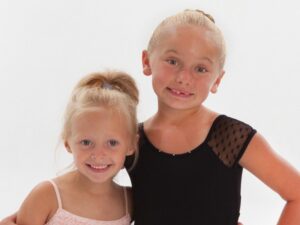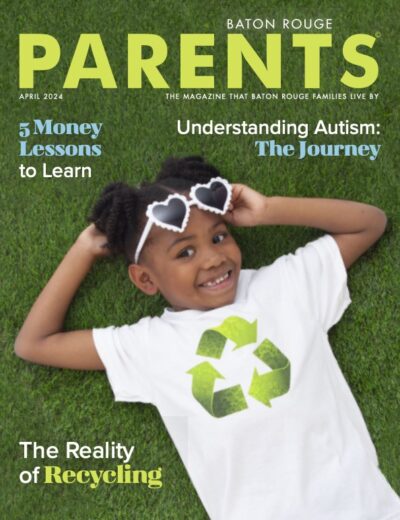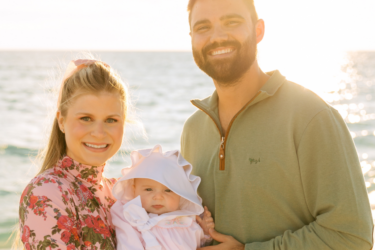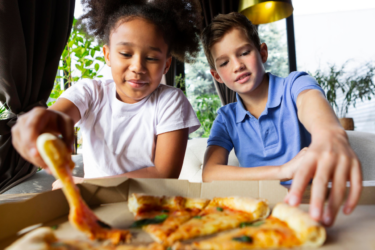
Leaps and Turns: The Impact of Dance
“Thank you for dance, God. Thank you for creating an avenue that allows me to reach closer to You. To speak honestly with my body when words just aren't going to cut it. For entrusting me with such a precious gift and empowering me to utilize it.”
Natalie Kirk, Baton Rouge native and dance major at University of North Carolina School of the Arts, posted this on her Facebook page. Her devotion to her craft began many years ago, as a little child, but has carried her to a place of knowledge and experience.
Dance classes start small, both in size of the dancer and size of the commitment. Those first recitals are saccharine sweet with mistakes and laughter, but if continued can lead to a deep passion that includes life lessons, self-expression, and personal growth.
Dance Beginnings
Toddlers in tutus sashaying across a stage create a chorus of oohs and ahs in the audience. This bright and bubbly beginning of dance can be the first step in a lifelong journey of dance. To start the dance odyssey with your little ones, whether they are 3 or 13, choose the right studio.
Carrie Webb, founder and owner of Revolution Dance Company, suggests that new dance parents should “invest a little bit of research” because you will be making a time commitment as well as a financial one. She advises, “Look for a place that’s nurturing and loving with a good ballet program. Ballet is the backbone, and without it, you're just doing steps.” Gwyn Defrances, co-owner, director, and teacher at DeFrances Dance Academy, agrees that ballet should come first because it is the foundation of all dance styles.
Keep all genres of dance in mind, though, “because versatility is key,” Webb says. “Find a program that has a convenient location, price schedule, and calendar; however, make sure your time and money are going into a program that delivers a good base of technique to your child.”
Technique or Performance?
When it comes to investing time, energy, and money into dance, consider your overall goal. Does your child hope to one day grace the stage of So You Think You Can Dance? Or does your child long to shine on the local stage in sequins at the annual recital? They can do both here in Baton Rouge.
Carrie pursued her dream all the way to Los Angeles and danced commercially until she chose to come back to teach the children of Baton Rouge. Her studio specializes in training. “They take whole classes in every subject all year, and they get better fast. We put on a show at the end of the year, but we do it in a different way,” she shares. Training this way “maximizes their potential in 10 months rather than only progressing in the recital dance. Everyone dances in our intensive level programs, so if a child just wants to come take class, they can, and they’re with dancers who want to work hard. Everyone is growing and working together. Other studios incorporate recital and technique classes. The Baton Rouge community needs that.”
The DeFrances Academy of Dance is one of those studios who offer both. Gwyn also made a career out of dance before joining her mother and sister in the family dance business of 47 years. “We have several layers of classes that we offer, classes for the recreation student with their goal being our end-of-the-year annual dance recital and technique-only classes for the more serious students, but which some of our recreation students also take,” she says. Both studios offer the staple subjects: ballet, jazz, tap, hip hop, contemporary, and lyrical. They each have competitive teams as well, which require more time and more finances.
It’s All About the Style
Just like in school, a dance student may have a favorite subject. Some may prefer ballet, while others may adore hip hop. Both Carrie and Gwyn insist that while that may be the case, being well-rounded is best.
“Each style of dance has it's own benefits. Ballet teaches children not only discipline, but it also teaches children control and body placement. Tap, hip hop, and contemporary teach children rhythm and musicality. Jazz teaches strength and lyrical teaches expression. Learning all of these will create a well rounded and talented dancer,” Gwyn explains.
Carrie also preaches that “versatility is a big deal with regards to dance training.” She continues, “To be the best at something, you've got to wear many hats. The dance world is full of styles, and all styles are meant to entertain and share with an audience. It all builds greatness, and with any profession, the more well rounded you are–the better.”
Dance Lessons
Dance is a "loophole to life," Gwyn proudly proclaims. No matter how long a dancer trains, whether one year or thirteen years, life lessons will follow. “Dance is such a great tool to cultivate hard work and discipline in your children,” Natalie shares, speaking from experience. Just like team sports, dance builds core values that will help young women and men navigate life’s challenges. Carrie and Gwyn both promote that dance teaches discipline, respect, dedication, and hard work. They are confident that their teaching goes beyond the stage.
"I'm here to help raise humans," Carrie says. She believes that dance teaches you “how to work with a group, how to fail, how to succeed, how to work hard for what you want, and unfortunately, how to work hard and still not get what you want. It teaches you about sacrifice and making wise choices.”
The lessons continue. Gwyn adds, “Dance also teaches children how to learn, work with others, manage their time, and appreciate that each individual has a purpose and something different to contribute. It teaches that with hard work, anything can be achieved, but also that you are going to fail or be disappointed at times if you aren’t placed where you want or cannot do ‘that particular step.’ These are life lessons that need to be learned in order to function and be a respectable and responsible human being in the adult world
one day.”
Express Yourself
We live in a world that can feel isolated at times. Sometimes children experience emotions they don’t know how to process or express. Dance can be a bridge to the other side and give them the method to express those emotions. “We teach kids to express themselves through dance every day! Listen to your music. If the words are happy and fun, then let us see that on your faces. If it is a sad or sweet song, let us see that on your face,” says Gwyn.
Not only can it be therapeutic for the dancer, but with the right choreography and music, the dancer can provide a beautiful emotional experience for the audience. Carrie explains, “It doesn't matter what shoes are on your feet. Although dance brings the dancer pure joy, it is meant to fill an audience with the emotions of that particular piece. It's not about the dancer anymore. It's about taking your love and sharing it with the masses. To make them feel that same joy, love, pain, loneliness, relief, sadness, grief. We are here to share with others and enhance their lives in just one performance.”
Natalie agrees, “Dance has the power to bring a lot of people together. As ballet has evolved more into modern and now contemporary dance, it is really amazing to see what a choreographer can ‘say’ so clearly through movement.”
Dance Success
Is success winning a televised competition, dancing on Broadway, learning a difficult turn or overcoming stage fright? The answer can be all of these and more. Maybe your child will dance for years and become a teacher like Carrie and Gwyn. Or maybe not. Either way, they will grow in positive ways from dance.
If your child continues to progress in dance and competes at a high level, they “must sacrifice a great deal of social time to commit to an activity like dance training,” but, Carrie shares, “it's like a secret bond among the kids. They all love it, and they know that about one another, because they're all still here.” On the other hand, if your child only dances for two or three years, they will still gain core values and become a part of something larger than themselves. Gwyn insists that “each and all of our students are a blessing to our staff no matter what age or level they are on. We try to nurture and encourage each one of them to be the absolute best person that she or he can be!” ■





